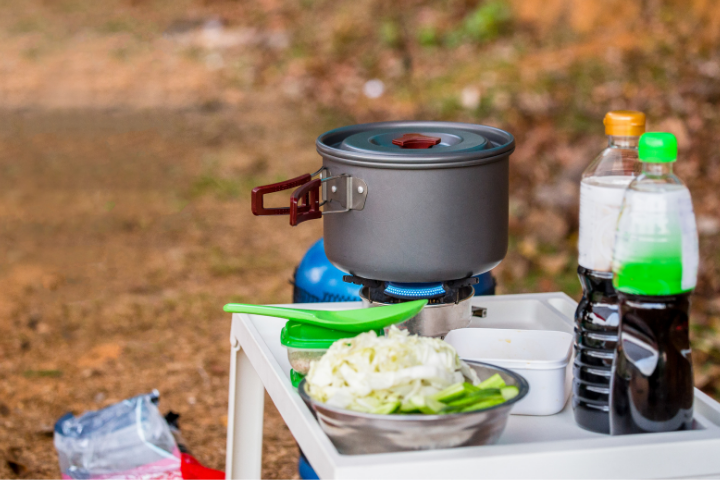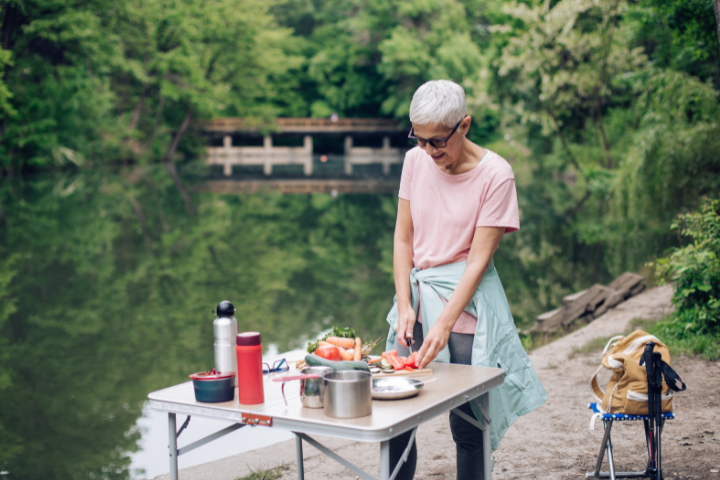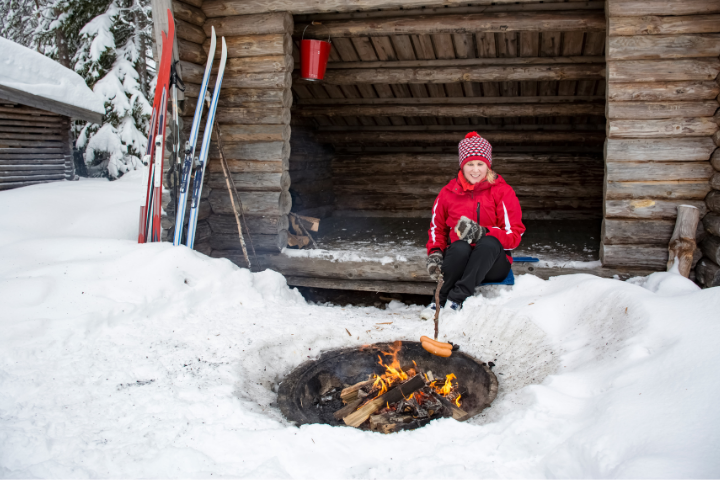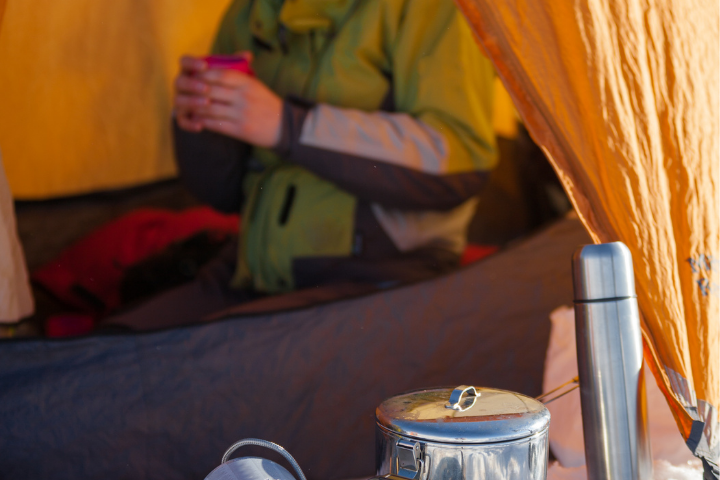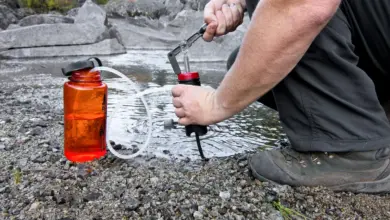Are you worried about your food during winter camping? Find out how to keep food from freezing winter camping style.
Winter camping is not everyone’s cup of tea. The low temperatures and heavier camping gear make things extremely challenging. If you like to chill while camping, winter camping might not be your favorite, but winter camping is the best if you like a bit of adventure.
Even if hardships don’t bother you much, no one likes to compromise on food, and keeping your food hot during winter camping is a challenging task.
I will list the various methods that you can use to heat your food while camping and mention the type of foods more convenient to carry during winter camping.
But first, let’s see why it’s even more important to eat well during winter camping.
Why You Need To Eat Well During Winter Camping
Camping requires a lot of physical activity, and for that, you need energy. When you camp during the winters, physical activities are not the only reason you require energy.
You require some extra energy in winters for your bodies to generate more heat that can counter the freezing cold outside and also save you from severe conditions like hypothermia.
Food and energy pretty much go hand in hand. A healthy and complete meal can even make you sweat, which is called diet-induced thermogenesis.
In the simplest words, it is a physiological process in which your metabolic rate speeds up when you eat as your bodies work to digest the food. As a result, the body heats up because of the increased metabolic rate.
The point I am trying to make here can be broken down into two parts:
- Not having regular meals in colder temperatures will leave you drained and sluggish.
- Your core temperature will also drop more significantly and quicker compared to if you’re consuming healthy food regularly.
Besides these two points, your body will burn more calories in lower temperatures to keep you warm; therefore, your calorie intake must be higher than usual to keep your body functioning properly.
Now let’s see some of the foods that are more convenient to carry during winter camping.
What Type Of Food Should You Carry During Winter Camping: Freeze-Dried Food
Choosing the right type of food for winter camping is half the job done. I have listed the type of food effective for winter camping.
Freeze food is popular during summer camping because it handles the heat better, but it is equally suitable for winter camping. When resources are limited, rehydration becomes extremely convenient. One vital factor you need to keep in mind is finding a way to heat water to rehydrate the food.
Another name for dehydrated food widely used is freeze-dried food. These types of shelf food are ideal for winter camping.
Suppose you want to carry freeze-dried food while camping. In that case, you can also buy pre-dried readymade food, or you can even make your personalized dehydrated food with identical consistency as that of the food you buy from a supermarket. Besides, homemade food is expected to be more healthy and affordable.
But you need to keep in mind that there shouldn’t be many changes in temperature in your homemade dried food. For instance, your food is usually hot when you prepare it, but you can see some hot moisture forming within the container or bag if it gets cold quickly.
The hot moisture will cause molds over the food. It’s usually not an issue if you are camping for a day or two, but if you don’t keep every food item with precaution, then there’s a chance it will be wasted.
Examples Of Freeze-Dried Or Dehydrated Food
We understood from the previous section that dehydrated foods are excellent for winter camping. But what are some of the foods in this category that works really well? Let’s see.
- Dehydrated Chili Turkey: It is a great food for winter camping. The chili loses water because turkey meat is lean, while the tomatoes and beans make the meal flavorful and offer enough proteins, carbs, and fats required for a meal in the frozen conditions.
- Banana Chips: Banana chips are a great option if you want to bring dehydrated fruits. The best thing about the chips is that you won’t have to rehydrate them, making them an excellent meal to munch.
- Freeze Dried Vegetables: Freeze-dried vegetables can be used effectively with a mixture of water and concentrate. This combination can be really effective in making a large plate of pasta or make some hot soup which is an excellent meal in winter.
- Dry Fruits: Dry fruits might not be a complete meal, but they are highly nutritious as a snack to keep you energized. It is always helpful to carry a pack of nuts, almonds, or cashews.
Dry Foods
Dry foods such as rice, beans, pasta, etc., are a great option, too, during winter camping. If you can arrange a campfire or stove, you can cook a fresh meal altogether.
How To Use The Freeze Dried Stuff During Winter Camping
It is not really a complex process, and if you follow some simple steps, a ten-year-old can handle it.
- It is better to bring the frozen foods in a vacuum seal bag.
- Use a pot to boil water over a campfire or stove.
- After that, put the meal into boiling water to let it thaw and warm it up.
- That’s it; you’re done. You can enjoy your warm meal.
This process can be followed with all types of food I have mentioned so far.
How To Heat Your Food During Winter Camping
Insulate Your Eatables
Insulating your food does the same thing as insulating your bodies or tents; it does not let the outer atmosphere mess with the inner heat.
You don’t need much technology here; simple things work the best. Some decent options include:
- Spare fleeces/jackets
- Spare hiking socks
- Sleeping bag
If you don’t want to include your personal things and you’re okay with spending some extra bucks, you can bring:
- Insulated bag with zip-lock varieties
- Soft walled insulated coolers if you don’t have much space in the backpack, soft walled insulated coolers, and hard-walled ones if you need better insulation.
Insulated coolers keep your food warm in low temperatures just like they keep them cool in summers. In addition, without the added ice insulator cooler, just keep out cool air in winter and warm air in summer.
Besides, it’s also easier to store food in an insulated cooler.
Using Body Heat
Where you pack your food is also an important part. Most people carry food in their backpacks while hiking to the place where you will camp. Fortunately, while traveling, you have a bio heating system that is your own body to keep food heated.
Your body always produces heat but even more during excessive physical activity like hiking with a heavy camping kit.
If you want the best results, keep the food as close to your body in the backpack’s back panel. If you like to munch some snacks while hiking, stash them in your pocket or even your shirt if required (remember to keep your shirt tucked in).
Campfires & Other Insulators
You can create a pantry in your campsite to keep your food warm overnight or when you’re just chilling.
Some insulating ways in the morning include:
- Wrap your food in the sleeping bag in the tent.
- Keep the food near your campfire (you can also keep it near your neighbor campers’ campfire).
Some best ways in the evening include:
- Keep the food inside the tent that’s not supposed to be eaten on the same day.
- Keep the food you are planning to eat near the campfire, and if you do not have a fire, keep it inside the tent near your body.
When you go to sleep, you need to keep your next day’s breakfast safely to keep it edible for the following day. Some ways include:
- If the temperature is moderately cool, keep the food near to your body.
- In case the temperature is too low, keep your food inside the sleeping bag.
- Keep the food covered in snow as it’s a great insulator. Try this method only if you have an insulator cooler to prevent moisture.
Frequently Asked Questions
Will a cooler keep food from freezing in the winter?
Coolers are natural insulators and are widely used in summers to keep your food cold. But without added ice, it just works as a barrier between the outer atmosphere and the food inside. Therefore coolers are effective in keeping food warm.
Will a Yeti cooler keep things from freezing?
I just discussed how coolers are great insulators. Yeti is among the leading brands in this category and has several properties to keep your food warm and edible.
How cold is it too cold for winter camping?
Any temperature ranging from the high thirties to low forties Fahrenheit is considered to be way too cold for winter camping.
How do you keep food from spoiling while camping?
In winters:
- Use freeze-dried food.
- Insulation
- Use body heat
- Carry dry fruits
In the summer, it carries a lot of ice along with a cooler. You can also carry two coolers if required.
Wrap Up
We discussed how choosing the right food is equally important as keeping them heated in winter camping and how even the simplest things can get the job done without any high-tech equipment.
I hope these ideas have given you a few thoughts of your own on how you can keep your food warm during your next winter camping trip. Do share your own experiences, tips, and tricks which will benefit the community.
Happy Camping!
